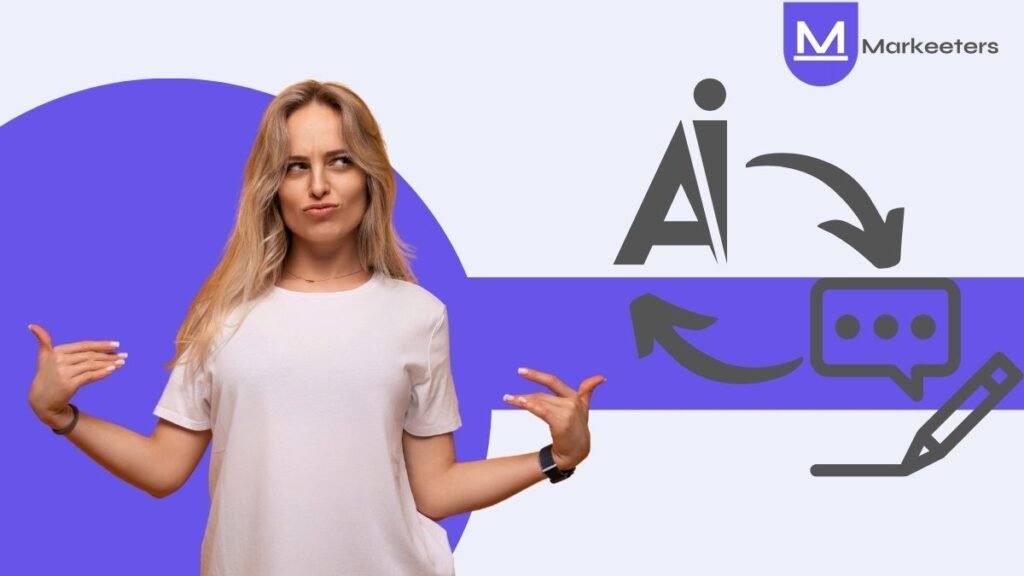In the ever-evolving technological realm, we are witnessing the rise of Artificial Intelligence (AI) in various facets of life. From our virtual friends like Siri and Alexa, to self-driving cars, AI is changing the game rapidly. But here is a million-dollar question: Will AI replace copywriters? Are we heading into a world where creativity will also be automated? Let’s dive into the AI copywriter debate.
What is Copywriting?
Copywriting is the art of crafting words, frequently referred to as “copy,” for use in marketing or advertising. The objective of copywriting is to persuade, engage and influence the reader or viewer to perform a certain action such as buying goods or services, signing up for a service or clicking on a link. It is a process to attract the attention of potential consumers and produce engaging content that they want to read. You may use it to make blogs, emails, sales copy and other types of digital content.
Copywriting is done to connect with the audience and establish long-lasting relationships with them. When the right words and tone of voice are employed, potential customers might feel a connection which leads to a call-to-action (CTA). It is essential to both social media and content marketing initiatives.
What is Artificial Intelligence (AI)?
The replication of human intelligence processes by computer systems is known as artificial intelligence or AI for short. In other words, it involves creating tools or software that can imitate cognitive processes including perception, learning, reasoning, problem-solving and even language comprehension.
What is AI Copywriting?
The process of creating content using artificial intelligence (AI) systems is known as AI copywriting. These systems imitate the language patterns of humans by using complex algorithms and machine learning approaches. The end result is really interesting content that closely resembles writing produced by a human. A user provides input data, such as keywords or topics pertaining to a certain subject, and AI copywriter uses this data to create grammatically and creatively consistent content which includes phrases and paragraphs. This is the core operation of the system.
These AI-powered engines use Natural Language Processing (NLP) to learn from their databases and continuously improve their skills over time with amazing efficiency. They are equipped with millions of references templates from various sources.
Artificial Intelligence and the Copywriting Sector
As we all know, artificial intelligence (AI) has swept the globe. AI is revolutionising business practices across a range of sectors, from self-driving vehicles to personalised shopping recommendations. But what about the copywriting sector? Many people are curious about how technical innovations may change the way we craft content for marketing. AI potential is enormous. It can produce the content at a faster rate tailored to the target audience’s needs. There are many powerful AI tools and the future of copywriting will be affected by AI. Cutting-edge technologies such as ChatGPT, and Jasper.ai can be a copywriter’s closest friend. Since AI is here to stay, we should embrace it.
Related Article: AI Tools That Existed Before OpenAI’s GPT
Will AI Replace Copywriters? The Pros and Cons of AI in Copywriting
The impact of AI in the copywriting industry is revolutionary. With the advancement of technology in natural language processing (NLP) and machine learning, the adoption of AI in copywriting has evolved beyond automating content generation to optimising marketing tactics and studying consumer behaviour. Let’s delve into the pros and cons of AI in copywriting:
Pros of AI in Copywriting
- Speed: We can create content more quickly with the assistance of AI. AI-powered technologies can quickly generate headlines, product descriptions, and social media copies, freeing humans up to concentrate on important things.
- Consistency: AI-powered solutions can produce consistent, high-quality content and maintain the voice and tone of a brand across all channels. Consistency helps connect with the customers and establish loyal relationships.
- Boost Engagement and Conversions: AI-powered technologies can create personalised and relevant content that makes a connection with the target audience by analysing data and user behaviour. Custom content helps in achieving higher engagement and conversion rates which also increase the revenue and sales for the business.
Cons of AI in Copywriting
- Lack of Creativity: AI-powered copywriting is not all glitter, rainbows and unicorns. AI-driven systems struggle with originality. It may not completely replicate the creativity required for copywriting. This becomes challenging for marketers.
- Emotionless: AI struggles to grasp and convey genuine human sentiments. It produces informative content, however, it lacks the emotions that can grasp the attention of the audience.
- Lacks Human Interaction: Copywriting is not just about informing and educating, it is also about establishing relationships with the audience. AI cannot replicate shared experiences, empathy and human interactions.
AI-Powered Copywriting Ethical Factors
Marketers need to consider certain ethical concerns that come with AI-powered copywriting. One major concern is bias. AI algorithms are biased because they are trained on a predetermined set of data which leads to biased output. The bias may result in unequal content creation that might exclude certain target audiences.
Transparency is another ethical dilemma. Marketers need to be transparent about the use of AI-powered content creation technologies. Customers have the right to know if the given information is created by a human or an AI-powered technology.
Finally, there is an issue of data privacy. AI needs data to create content. It is the responsibility of marketers to ensure that the data we utilise is obtained properly and consumer privacy is maintained.
Adapting to a World with AI
Copywriters have to adjust as AI-powered copywriting becomes more prevalent. One approach is to embrace the promise of AI-powered products while being aware of their limitations. To create generic content fast and effectively, we should leverage AI-powered technologies, but we should also rely on human copywriters to provide originality, assure quality and add emotions to it. Invest in training and acquiring new skills to stay updated with the trends. We should be proficient enough to create generic content with the assistance of artificial intelligence.
Also Read: Is Pinterest Social Media or a Search Engine?
Conclusion
AI alone will not replace copywriters, however, a writer proficient in AI-powered tools might. AI-powered copywriting is transforming the world but there are drawbacks as well. By embracing the potential of AI-powered technologies and learning their limitations, we must adjust to this new environment. Copywriting still plays an important role in businesses of all sizes. So dear writers, continue writing and upskilling yourself with the latest AI technologies.
Frequently Asked Questions
How will AI affect writing copy?
The voice and tone of a brand may be maintained across all channels with the help of AI-powered solutions that can produce consistent, high-quality content.
What role will AI play in copywriting in the future?
AI copywriters are getting more capable and skilled with the advancement in Natural Language Processing (NLP) and other technologies. Invest in mastering the tools so you can stay updated with the latest technologies.
Will copy editors be replaced by AI?
Although AI is unlikely to completely replace editors and proofreaders, it has the potential to have a big influence. As AI tools develop and improve, they will be able to complement human editors and proofreaders in a meaningful way by spotting mistakes, enhancing readability, and enhancing overall quality.
How will AI influence creative writing in the future?
Personalised content creation for specific readers is one of the most exciting uses of AI in creative writing. AI algorithms may provide information that caters to a reader’s interests and reading level by looking at their reading preferences and history.
Is AI displacing human creativity?
The greatest promise of generative AI is not in replacing people, but in assisting humans in their individual and group endeavours to develop previously unthinkable solutions. It has the potential to equalise creativity.





